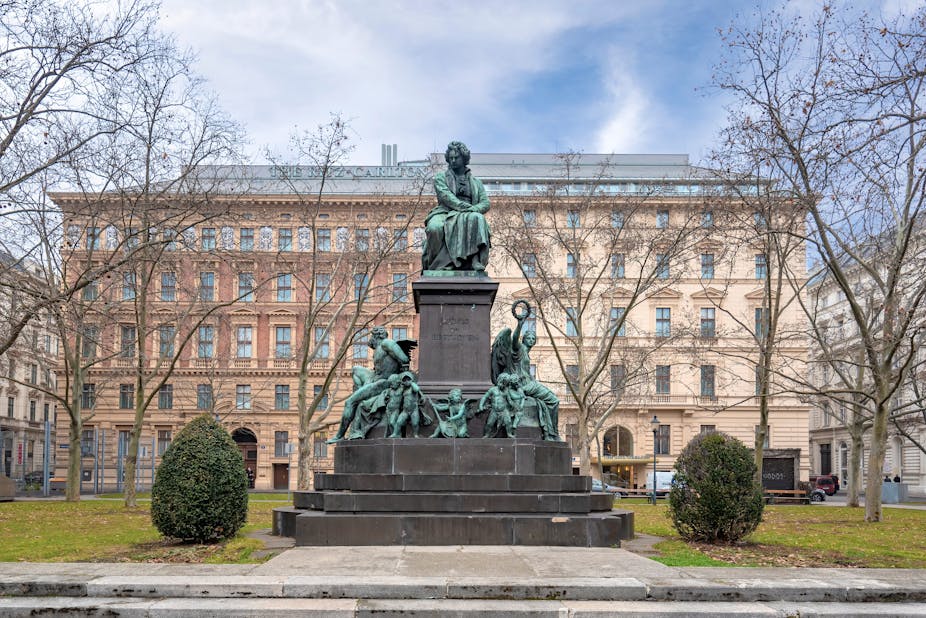Freedom in Beethoven’s music takes many, frequently overlapping forms. There is heroic freedom in the Eroica (1803), freedom from political oppression in the Egmont Overture (1810), artistic freedom and innovation in the Ninth Symphony (1824).
Today, Beethoven’s music remains deeply connected with a true humanism, which has the principles of freedom and self-determination at its heart.
The composer’s music grew out of the age of European Enlightenment, which located human reason and the self at the centre of knowledge. The German philosopher Immanuel Kant understood enlightenment as the ability to use one’s understanding without the guidance of another. Enlightenment is achieved when we have the freedom to rely on our intellectual capacities to determine how to live. This process of internal legislation based on reason is for Kant equivalent to the principle of free will.
A contemporary of Kant, Georg Hegel was also a philosopher of freedom, autonomy, reason and will. Hegel, like Kant, understood the free individual as someone who self-consciously makes choices through the action of a will governed by reason. Hegel adds a further dimension of social freedom, which he conceives as the actualisation of free will. In his Phenomenology of Spirit (1807), Hegel famously describes freedom as “the highest destiny of the human spirit”.
Music as will
In its exploration of the freedom of human spirit, reason and will, 18th and 19th-century German thought provides the intellectual context in which Beethoven composed. Beethoven imbibed this spirit, writing in an 1819 letter that:
Freedom and progress are our true aim in the world of art, just as in the great creation at large.
To understand how the sounds of Beethoven’s music communicate this philosophy of freedom we must reflect on a curious process by which Beethoven’s music came to be heard as the movement of the will itself.
To the German philosopher Arthur Schopenhauer Beethoven’s symphonies were a direct representation of the will, “a true and perfect picture of the nature of the world which rolls on in … innumerable forms”.
Schopenhauer’s will draws on Aristotle’s understanding of anima (spirit or mind) as the animating or moving principle. As the musicologist Daniel Chua explains, this Aristotelian idea of will as self-movement is key to 19th-century musical thought. Both freedom and will were understood as movement – and no music evoked this better than Beethoven’s. Through their dramatic motion, Beethoven’s symphonies, in particular, demonstrated the will enacting its freedom and unfolding its destiny.
Following Schopenhauer, the composer Wagner reflected on Beethoven’s music as expressing the will in his 1870 centenary essay. He turns instead to the late quartets, praising Beethoven’s C-sharp minor quartet (opus 131) as “the dance of the whole world itself”. In The Birth of Tragedy (1872), the philosopher Nietzsche similarly sees Beethoven’s music as expressing the will.
Unsurprisingly, a composer who could capture the very essence of human freedom in sound would himself come to be cast in the image of his music and mythologised as a liberator. During his life and after, Beethoven was held up as a Promethean figure – a creative and defiant innovator, liberating music from convention.
Different writers offered variations on this theme. Wagner describes Beethoven as Columbus, exploring the sea of music and making new discoveries in the Ninth Symphony. By the 20th century, Beethoven was known as “the man who freed music”, as described in the title of a 1929 study by the American biographer and musician Robert Schauffler.
Freedom as joy
Of course, nowhere is Beethoven’s legacy of artistic freedom more visible or memorable than in his introduction of the “Ode to Joy” in the Ninth Symphony, which marks the first appearance of choral music in a symphony. For some, Beethoven’s musical setting of Friedrich Schiller’s poem suggests an almost naive joy in human unity and brotherhood.
The symphony’s chorus also celebrates the meeting of the world with its creator, who “surely dwells among the stars”. This image is often associated with Beethoven’s February 1820 entry in his notebooks:
The moral law within us and above us the starry sky. Kant!!!
In other words, Schiller’s poem suggests to Beethoven an image of the will as both human and transcendent. Joy here is the realisation of morality as freedom.
The freedom of the will remains at the centre of Beethoven’s music. And so, 250 years from Beethoven’s birth, his music continues to offer his listeners a freedom that is experienced or echoed in the depths of their innermost selves. Beethoven’s music is the sound of human freedom at its core – the freedom of our minds, spirit or consciousness.

